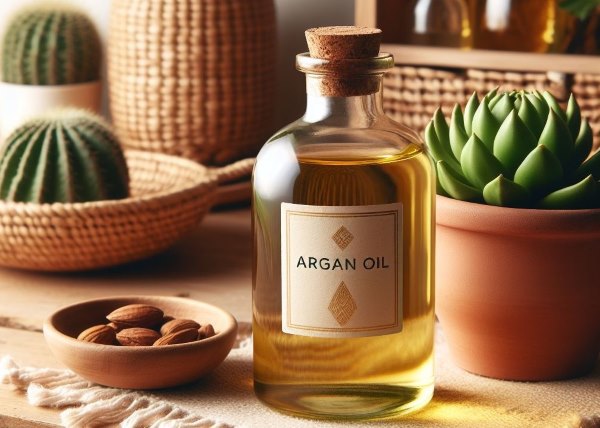Argan oil, often referred to as “liquid gold,” is a precious oil extracted from the kernels of the argan tree (Argania spinosa), which is native to Morocco. This versatile oil has been a staple in Moroccan cuisine, medicine, and beauty practices for centuries. In recent years, argan oil has gained international acclaim for its myriad health and cosmetic benefits. This article digs into the nutritional profile, benefits, uses, therapeutic advantages, properties, side effects, and interesting facts about argan oil, supported by scientific evidence.
Nutritional Profile of Argan Oil
Argan oil is rich in essential fatty acids, antioxidants, and vitamins, making it a powerhouse of nutrition for both internal and external use. Here is a detailed breakdown of its components:
Fatty Acids: Argan oil contains about 80% unsaturated fatty acids. The primary fatty acids include oleic acid (43-49%), linoleic acid (29-36%), palmitic acid (11-15%), and stearic acid (4-7%) (Source).
Vitamin E: A potent antioxidant, argan oil is exceptionally high in vitamin E (tocopherol), which helps protect skin cells from free radical damage (Source).
Polyphenols: These compounds have anti-inflammatory and antioxidant properties, contributing to overall health .
Sterols: The oil contains schottenol and spinasterol, which help support skin barrier function and reduce inflammation (Source) .
Benefits of Argan Oil
1. Skin Health
Argan oil is renowned for its ability to hydrate and nourish the skin. Its high vitamin E content and essential fatty acids help to:
Moisturize the skin: It is an effective moisturizer, suitable for all skin types, and helps to soften and hydrate the skin .
Reduce signs of aging: The antioxidants in the oil, particularly vitamin E, help reduce wrinkles and improve skin elasticity .
Treat skin conditions: It can help in managing skin conditions like eczema and psoriasis due to its anti-inflammatory properties.
2. Hair Care
Argan oil is a popular ingredient in many hair care products because it:
Strengthens and nourishes hair: The oil penetrates the hair shaft to improve elasticity and reduce breakage .
Promotes hair growth: Its nourishing properties stimulate hair growth and reduce dandruff .
Adds shine and smoothness: Regular use of this miracle oil can make hair shinier, smoother, and more manageable.
Also Watch: What Oils are Best for your Hair?
3. Heart Health
Consuming argan oil can benefit heart health by:
Reducing cholesterol levels: The unsaturated fatty acids, especially oleic acid, help lower bad cholesterol (LDL) and increase good cholesterol (HDL).
Protecting against atherosclerosis: The antioxidants in this oil can reduce inflammation and oxidative stress, which are linked to heart disease.
4. Anti-Inflammatory and Antioxidant Properties
Argan oil’s rich content of antioxidants and anti-inflammatory compounds can:
Reduce inflammation: Its sterols and polyphenols help mitigate inflammation in the body, beneficial for conditions like arthritis .
Protect against oxidative stress: The oil’s antioxidants help neutralize free radicals, reducing the risk of chronic diseases .
Know all about Argan Oil Uses
Cosmetic Uses
- Facial moisturizer: Apply a few drops to the face and neck to hydrate and nourish the skin.
- Hair conditioner: Use as a leave-in conditioner to detangle and smooth hair.
- Lip balm: Apply to lips to prevent dryness and chapping.
- Nail care: Massage into cuticles to strengthen and moisturize nails.
Culinary Uses
- Salad dressings: Drizzle over salads for a nutty flavor and health benefits.
- Cooking oil: Use in low to medium-heat cooking for a nutritious boost.
Also Watch: What Foods Damage your Hair
Therapeutic Advantages
Argan oil’s therapeutic benefits include:
Wound healing: Accelerates the healing of minor wounds and cuts due to its anti-inflammatory and moisturizing properties .
Acne treatment: Helps regulate sebum production, reducing acne and promoting clearer skin .
Properties of Argan Oil
Anti-inflammatory: Reduces inflammation and soothes irritated skin.
Antioxidant: Protects against oxidative damage and premature aging.
Moisturizing: Hydrates and nourishes the skin and hair.
Side Effects
Whilethe oil is generally safe for most people, some may experience:
Allergic reactions: Those allergic to tree nuts may have a reaction to argan oil. Patch testing is recommended before full use.
Skin irritation: Rare cases of skin irritation can occur, especially with pure, undiluted oil.
Interesting Facts
- Cultural Heritage: The oil production is a traditional practice in Morocco, often carried out by women’s cooperatives.
- Sustainable Production: Argan trees are a vital part of the ecosystem in southwestern Morocco, helping to prevent soil erosion and desertification.
- Labor-Intensive Process: Producing this oil is labor-intensive, often done by hand, which contributes to its higher cost.
Scientific Evidence
Numerous studies have supported the benefits of argan and it’s oil:
- A study published in the Journal of Clinical and Aesthetic Dermatology found that topical application of argan oil improved skin elasticity and hydration in postmenopausal women (Source).
- Research in the European Journal of Lipid Science and Technology highlighted argan oil’s effectiveness in lowering cholesterol levels and protecting against heart disease (Source).
Argan oil is a versatile and beneficial oil that has been valued for centuries for its health and cosmetic benefits. Rich in essential fatty acids, antioxidants, and vitamins, it offers a wide range of advantages from skin and hair care to heart health. While generally safe for most people, it is important to perform a patch test before use to avoid potential allergic reactions. Incorporating argan oil into your daily routine can lead to healthier skin, hair, and overall well-being.
Source and Reference:





